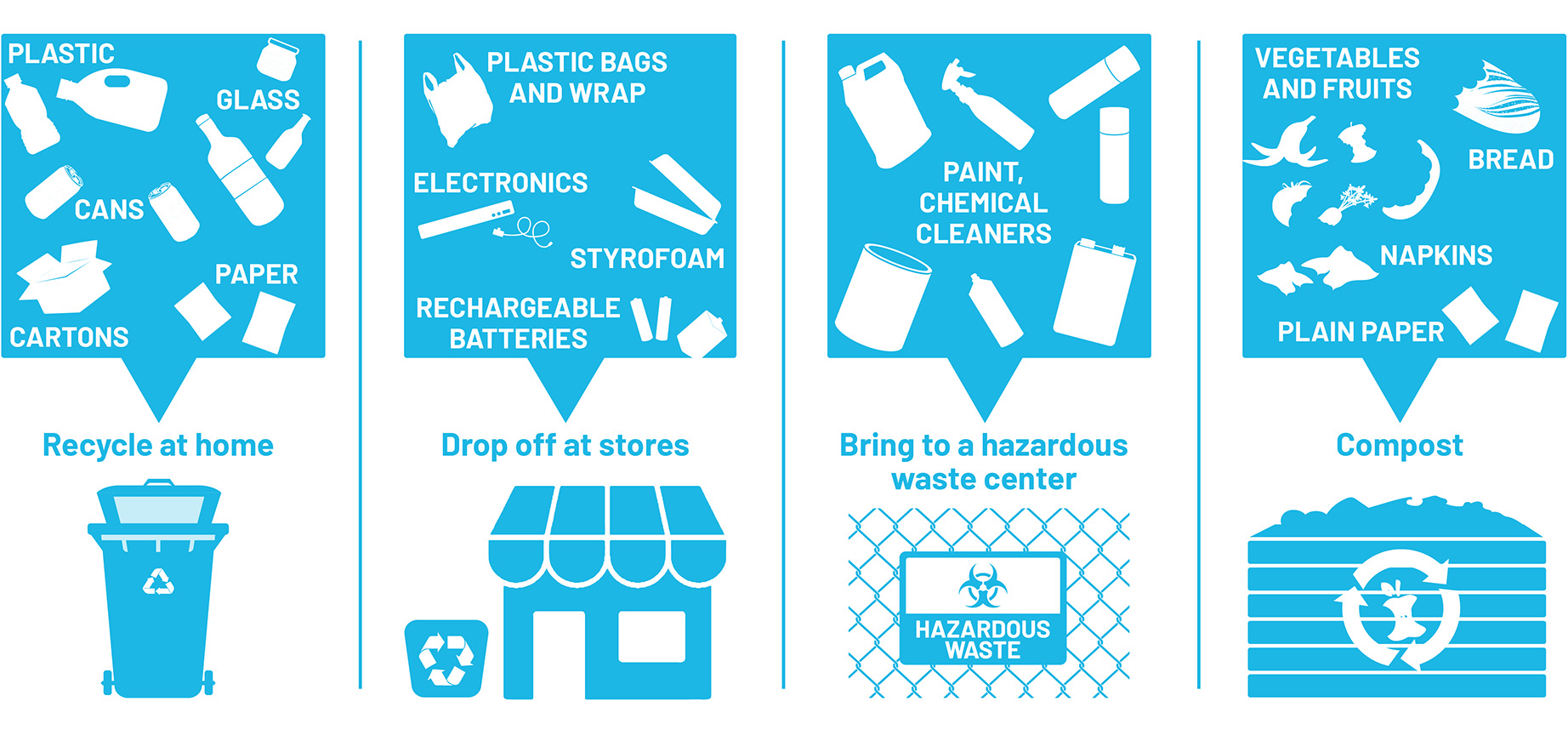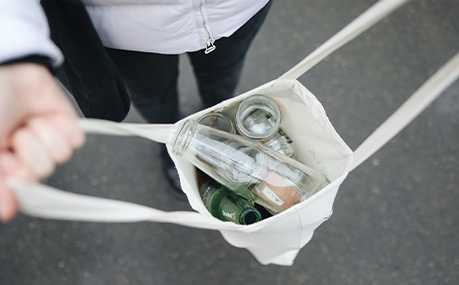Last Dance Before the Landfill
Recycling cans, bottles, cardboard, and plastic is helpful for the environment. Less garbage winds up in our landfills and less energy and water is wasted extracting and processing virgin materials. But recycling is not a perfect endless loop as the logo suggests. The most effective way to reduce your trash is to first reduce, reuse, repurpose, and restore what you can, then recycle all you can. We break it down to show you what goes where—what goes in your curbside bin, what can be dropped-off at the store or mailed back to the manufacturer, and what hazardous items need special handling.

Just because something has the recycle symbol on the packaging, doesn’t mean it can be recycled locally. It can end up contaminating the valuable recyclables. About 15% of what we toss in the recycling bin has to be picked out and sent to the landfill anyway. But there are more options for recycling than just your curbside recycle tote.

Cost: Free
YES: Clean and dry newspapers, magazines, writing paper, envelopes, paperback books, paper bags, paperboard boxes (tissue, soda, cereal, cracker with liner removed), cardboard boxes.
NO: napkins, tissues, paper towels, paper cups, paper plates (these can be composted), coated or shiny paper.
YES: Rinsed aluminum cans, foil trays, steel and tin cans and their lids, empty aerosol cans.
NO: pots and pans, hangers, foil wrap.
YES: Rinsed glass bottles and jars with lids.
NO: dishes, glassware, mirrors, pane glass, light bulbs
YES: Rinsed drink boxes, milk, and juice cartons.
YES: Rinsed plastic bottles, jugs, and containers with lids on.
NO: plastic bags and wrap (store drop-off), Styrofoam (store drop-off), candy wrappers, chip bags, pouches, straws, utensils, hangers, hoses, cords, toys, packing materials, #6 plastics
Download these visual reminders to print and post near your trash and recycle bins.
Recycle By Room (bathroom, kitchen, office)
Cost: Free
While it’s better to refuse plastic bags and Styrofoam and use durable alternatives, these two ubiquitous and problematic plastics are hard to avoid. They are the nemesis of municipal recycling programs where they jam up equipment and contaminate recovered materials. However, you can sort them out and drop them off where you shop, where they are baled and shipped to specialized recyclers.
YES: clean, dry plastic bags (grocery, produce, newspaper, bread, zip-top, and dry cleaning bags), plastic wrap, bubble wrap, plastic shipping envelopes.
NO: “crinkly” pre-washed salad bags, frozen food bags, candy wrappers, chip bags, six-pack rings
WHERE: Publix, Wal-Mart, Winn Dixie, Target, Lowe’s, Kohl’s. Find a drop-off location.
YES: clean and dry foam egg cartons, takeout containers, meat and produce trays, cups
NO: cups with lids and straws, packing peanuts, foam blocks used in packaging
WHERE: Publix
Most electronic devices, from computers to cell phones to games and gadgets, can be restored and re-sold, or recycled to reclaim valuable resources like precious metals. Some newer models have trade-in value. Rechargeable batteries and cellphones are a fire hazard and should never be tossed into the garbage. Give your cellphone a second life by donating to a charity like 911 Cell Phone Bank, Medic Mobile, and Cell Phones for Soldiers. Or drop-off or mail-in unwanted electronics at these locations.
WHAT: Rechargeable batteries and cellphones
WHERE: Staples, Lowes, Home Depot, uBreakiFix, and more. Find a drop-off location
WHAT: Most electronics
WHERE: Best Buy, Staples, Amazon
WHAT: Printer ink and toner cartridges
WHERE: Best Buy, Staples
Many consumer products, like toothbrushes, cigarette butts, and razors, that seem like they should be recycled aren’t accepted anywhere. Terra Cycle’s free product recycling programs help you recycle items that municipal programs don’t typically accept. Dozens of major brands like Brita, Gillette, Rubbermaid, Swiffer, and Teva will take back their product waste. Sign up for free.
Recycle everything with Terra Cycle. This innovative company sells the Zero Waste Box that allows you to recycle nearly everything not accepted by your municipal recycling program. Fill it up, tape it shut, and mail it back with a pre-paid shipping label.
Cost: Free
Common household products like those stored in your garage can release toxic propellants, chemicals, and metals into the atmosphere and waterways when they are crushed in garbage trucks or placed in the landfill. Products labeled flammable, toxic, corrosive, dangerous, warning, or caution are considered hazardous waste and cannot be recycled or thrown in the trash. Instead, drop them off at County collection centers.
WHAT: alkaline batteries, automotive chemicals, cleaning chemicals, lawn and garden chemicals, pool chemicals, paint, fire extinguishers, fluorescent lamps, fuel tanks, tires
WHERE: Chemical Collection Center

One year of 0 people recyling all they can is the GHG equivalent of:
0 ace of forests growing over one year
0 tree seedlings grown for 10 years
0 miles driven in a gas-powered car (22.5mpg)
How are these calculated?
Greenhouse Gases Equivalencies Calculator (EPA.gov)
Communities for Recycling (Recycling Partnership)
Find out what’s happening and join in with our comprehensive community events listing.
Look for this class
Earth 911 Comprehensive Searchable Guide to how and where to recycle over 350 materials.
Keep America Beautiful tool to look up any material, learn if and how to recycle it, and how the recycled material is reused.
While it’s better to reduce waste by refusing or reusing, recycling does conserve energy and natural resources and reduces air and water pollution. Extracting raw materials, processing them into components, and manufacturing new items is much more costly than recycling and reusing materials. In fact, recycling a ton of office paper can save the energy equivalent of 322 gallons of gas; recycling a ton of aluminum conserves the equivalent of 1,024 gallons of gas! Recycling just 10 plastic bottles saves enough energy to power a laptop computer for more than 25 hours. Recycling materials avoids emissions and saves water.
Calculate Your Recycling Footprint.
It’s called “wish-cycling”—dropping things in the curbside recycle tote in hopes they will be recycled. But this can contaminate the recycling stream so that truly recyclables can’t be retrieved. Some items like cords and small metal objects can jam or break machinery. This raises costs and adds an extra sorting step to the recycling stream for items that must be pulled out and sent to the landfill instead. Your wish turns into a recycling nightmare. When in doubt, toss it out. Calculate your household recycling footprint when you recycle all you can.
Several retailers, like Best Buy, Staples, and Amazon, offer free recycling programs and/or drop off locations for many types of electronics including cell phones, TVs, computers, cameras, and other equipment. If you are replacing a larger item, like a TV or major appliance, sometimes stores will haul out and recycle the old one for a small charge. If the item still works, consider donating it to a local Goodwill or other charity. For example, groups like 911 Cell Phone Bank, Medic Mobile, and Cell Phones for Soldiers accept cell phone donations.
Here are 10 steps you can take to improve the sustainability of your business:
By setting specific goals and implementing targeted initiatives, you can make meaningful strides towards sustainability while working towards becoming a Sarasota County Green Business Partner.
Submit your waste-related question to local experts. If selected, they will answer and feature your question on our FAQ. Not all questions will be answered.
Mind if we stay in touch?
We'll send you our free Toolkit Quick Reference Guide.
We'll never spam you or share your info. Unsubscribe at any time.
This site protected by reCAPTCHA and the Google Privacy Policy and Term of Service apply.
©2025 Science and Environment Council of Southwest Florida | Site by Chariot.